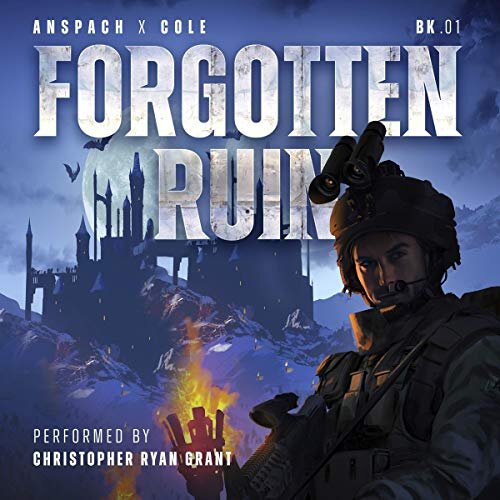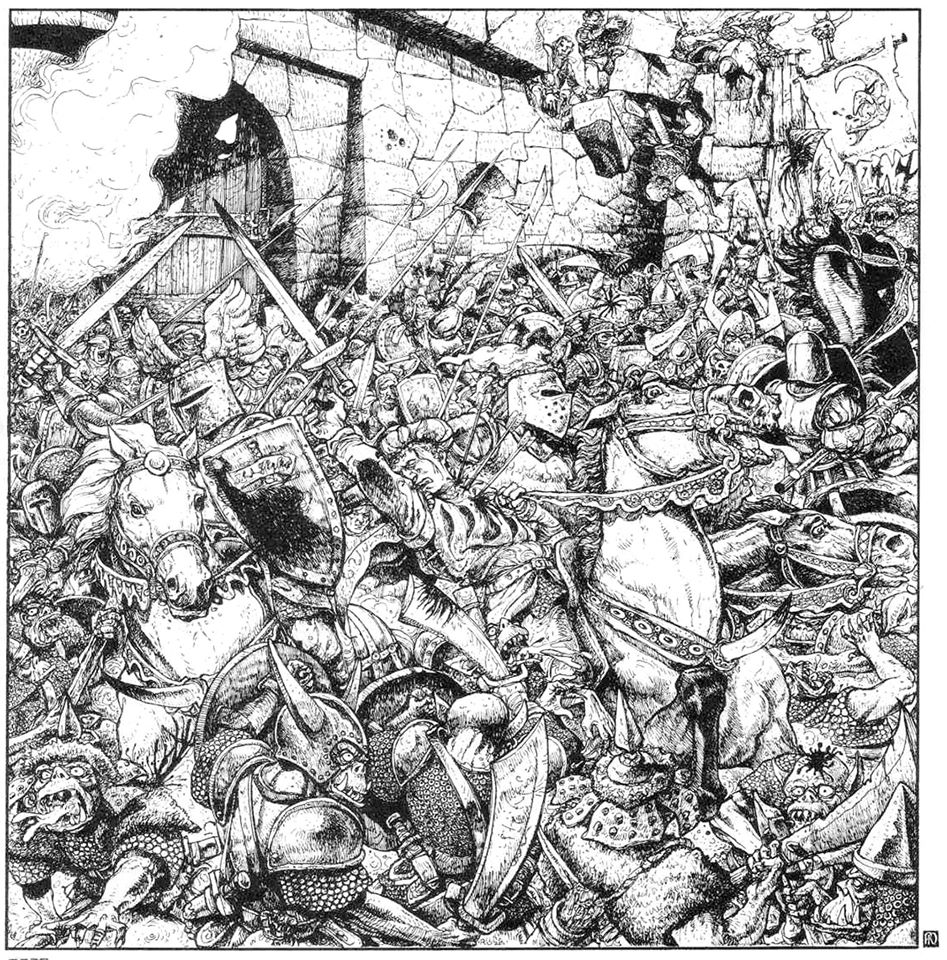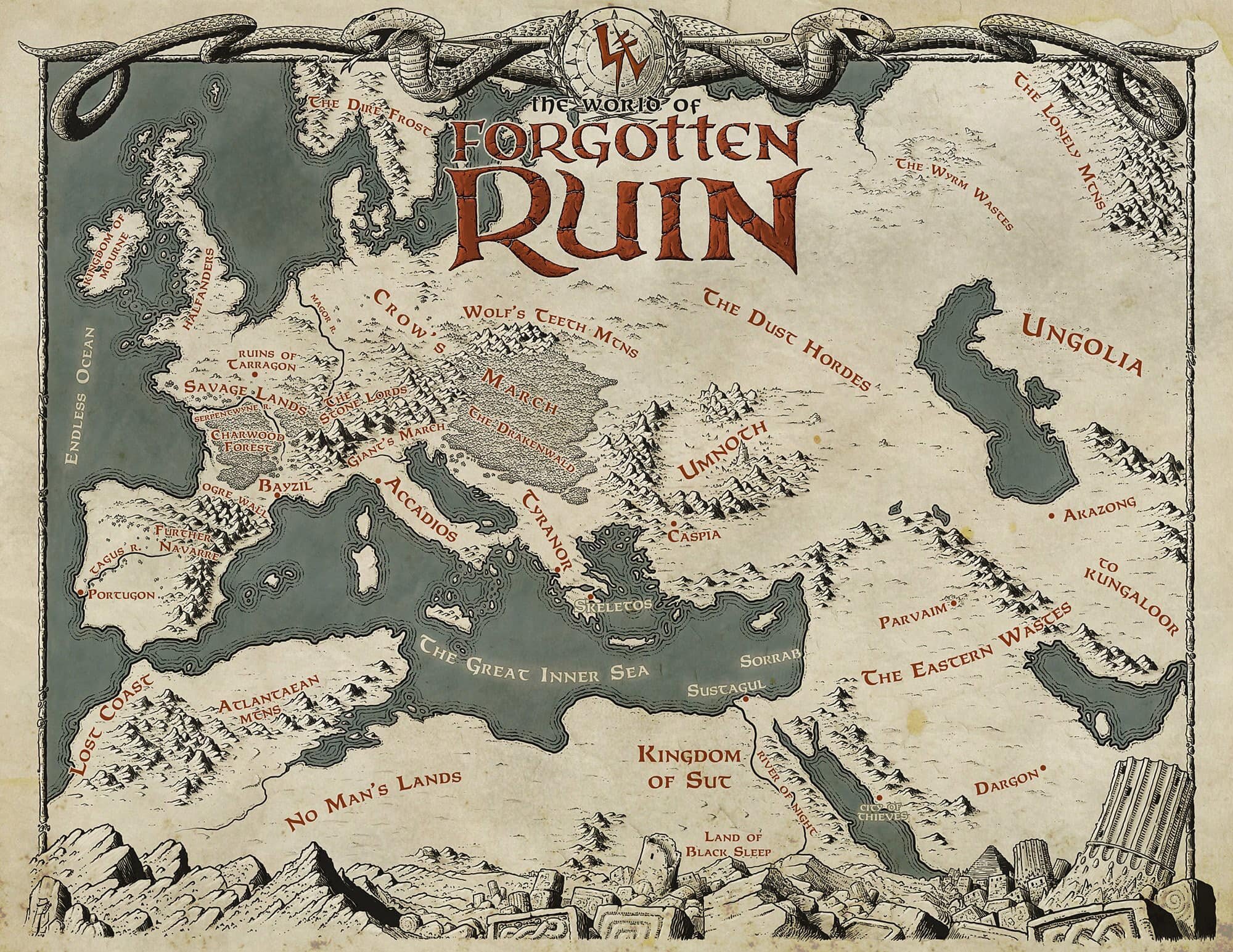Forgotten Ruin by Jason Anspach and Nick Cole Audiobook Review
Forgotten Ruin [Amazon link], the new audiobook by Jason Anspach and Nick Cole, narrated by Christopher Ryan Grant, is described by the authors as Tolkien meets Shock + Awe. I would describe it as a wonderful mashup of all of my favorite things in dudelit, the masculine adventure fiction that spans science fiction, fantasy, horror, and thrillers. This book manages to combine aspects of all of those in just the right proportions to be compulsively listened to.

by Jason Anspach and Nick Cole narrated by Christopher Ryan Grant Wargate Books (March 1st, 2021)
“When I began to dream in Elvish, it was then that I knew I could speak it. And it was when the orc horde overran one of the fighting positions along First Platoon’s sector on the east side of the island the Rangers were defending that I knew we weren’t in Kansas anymore.”
In the best science fiction tradition, Forgotten Ruin goes hard into the details of a technical subject while telling an adventure story. In this case, that subject is what it means to be a US Army Ranger. What weapons they use. Their tactics. How they think. The difference between being “tabbed” and being “scrolled”. I admit this is an extension of the usual definition of hard science fiction, but I think it is useful to extend that usual sense to cover other cases, because it produces similarly engaging stories.
Forgotten Ruin is a story told from the point of view of Talker, a rather unlikely soldier, and an even more unlikely Ranger.
“It took me seven degrees to finally realize I hate academia, and I’ve got this crazy desire to be a soldier.”
I appreciate the choice of Talker as the narrator and POV character. He is a bit of a dweeb, and very aware that he is not the stone cold killer that many of his battalion mates are. Christopher Ryan Grant does an excellent job with all this, and since the book is told in first-person, Grant makes Talker come alive. However, Grant rapidly switches into other characters as needed, like the laconic drawl of the Command Sergeant Major or the absurdly exaggerated Italian PFC Soprano, who clowns with an affected Mario Brothers accent.
As a book, Forgotten Ruin most closely resembles a war memoir. Which is a hard thing to do in fiction, as real memoirs don’t necessarily follow chronological order perfectly or retain every detail the narrator might have seen at the time. First-person accounts skip around and focus sometimes on odd details just because they stuck in the author’s mind. A real person writing down real memories just does this because that is how memory works, but simulating this a real test of talent, as many first-person books are just told by third-person omniscient narrators who use the word “I”. That isn’t the case here, and I salute Anspach and Cole for the work that must have taken.
We get to journey with Talker though the strange world he finds himself in, seeing everything through his eyes. And what a very odd world it is. While the book does owe a heavy debt to Tolkien, it also borrows heavily from the massive cultural accomplishment of Dave Arneson and E. Gary Gygax, who turned something that grew out of the niche hobby of miniature wargaming into a movement that altered popular culture forever. This book comes along at the perfect time for me, as I am currently obsessed with Dungeons and Dragons, especially the very biblicist OSR, which hews closely to the style of the game as it was played forty years ago.

As such, Forgotten Ruin also has thematic ties to many of the works of fantastic fiction that Gygax cited in Appendix N to the Dungeon Masters Guide, especially Jack Vance’s The Dying Earth, which is probably the pre-eminent work in establishing the post-apocalyptic tone of OD&D and AD&D. However, Forgotten Ruin also draws upon the well of very realistic military science fiction, like Jerry Pournelle’s Janissaries, that explores what would happen if a small band of men employing modern military tactics and weapons encountered say 9th century technology and society, and then draws out the implications of that.
However, unlike Jerry’s work, which focused on attempting to rebuild technology from the ground up and complicated political alliances, Forgotten Ruin is more straightforward adventure. Kill the bad guys, take their stuff, win the girl. Again, the choice of POV character is critical; PFC Talker sees things from the grunt’s point of view, much like in Anspach and Cole’s Legionnaire. If we instead saw things from the POV of the man Talker privately dubs Captain Knife Hand, we could very well end up with something more like Janissaries, which would focus on the burden of command and the grand strategy of survival. As it is, we get a very different experience.

And what an experience! In Forgotten Ruin we feel terror and wonder in equal measure. I cheered with Rangers when they won, and cried with them when they lost a friend. Here is where I think Tolkien is absolutely the correct choice of comparison, because the harrowing Korean War style battles that Talker endures are contrasted with scenes of sublime beauty that make your heart ache with longing. Despite being overrun with monsters, the world Talker finds himself in is fundamentally good, and his role in it is providential. Despite the horror of war, especially war with monsters of myth and legend, this is a uplifting book, one that is good for the soul.
This is the style of fiction I like best, and I am excited to listen to it again as soon as I am finished. I look forward to the future volumes in this series as well. Forgotten Ruin comes out on Audible on March 1st, and you can find the ebook at Amazon or the authors’ website ForgottenRuin.com. You can pre-order now, and if you just can’t wait, why not check out the Forgotten Ruin Fan Group on Facebook, the Forgotten Ruin book page on Facebook, or the Galaxy’s Edge Discord, for all the memes and hype.
I was provided an advanced review copy by the authors.
“Later, I talked to Sergeant Thor about it. About “normal” being gone. And this was his reply. ‘There is a normal after that, Talker. But it’s the new normal. Normal is relative, as in, what’s normal to the spider is pure terror to the fly. Be the predator, always, Talker. Always. That’s normal for a Ranger now.’”
My other book reviews | Reading Log
Galaxy’s Edge season 1:
Legionnaire: Galaxy's Edge #1 Book Review
Galactic Outlaws: Galaxy's Edge #2 Book Review
Kill Team: Galaxy's Edge #3 Book Review
Attack of Shadows: Galaxy's Edge #4 Book Review
Sword of the Legion: Galaxy's Edge #5 Book Review
Tin Man: Galaxy's Edge Book Review
Prisoners of Darkness: Galaxy's Edge #6 Book Review
Imperator: Galaxy's Edge Book Review
Turning Point: Galaxy's Edge #7 Book Review
Message for the Dead: Galaxy's Edge #8 Book Review
Retribution: Galaxy’s Edge #9 Book Review
Tyrus Rechs: Contracts & Terminations:
Requiem for Medusa: Tyrus Rechs: Contracts & Terminations Book 1 Review
Takeover
Takeover: Part 1 Book Review
Takeover: Part 2 Book Review
Takeover: Part 3 Book Review
Takeover: Part 4 Book Review
Takeover Book Review [summary for the omnibus edition]
Order of the Centurion
Order of the Centurion #1 Book Review
Iron Wolves: Order of the Centurion #2 Book Review
Stryker’s War: Order of the Centurion #3 Book Review
Through the Nether: Order of the Centurion #4 Book Review
The Reservist: Order of the Centurion #5 Book Review
Savage Wars
Savage Wars: Savage Wars #1 Book Review
Gods & Legionnaires: Savage Wars #2 Book Review
The Hundred: Savage Wars #3 Book Review



Comments ()